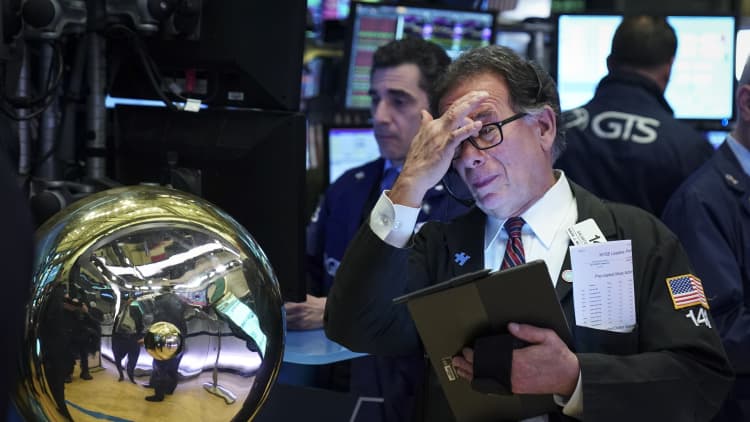
Stocks fell on Thursday, resuming a deep sell-off this week, ahead of new U.S. tariffs on Chinese goods set to go into effect at midnight.
The Dow Jones Industrial Average fell 138.97 points at 25,828.36 on Thursday, while the dropped 0.3% to 2,870.72 and the Nasdaq Composite lost 0.41% to 7,910.59. The Dow is down more than 650 points and the S&P 500 has lost about 2.5% this week after President Donald Trump threatened to raise tariffs on more Chinese goods over the weekend.
Stocks pared some of the losses on Thursday after Trump said it's possible to get a trade deal with China this week. The Dow had fallen nearly 450 points at its intraday low.
"It's possible to do it, they're all here," Trump told reporters at the White House Thursday. "The vice premier one of the most respected men, one of the highest officials in China is coming."
Goldman Sachs told clients even if the tariff hike goes through Friday at 12:01 a.m. ET, there is some wiggle room to still hatch a deal.
"We note that details in the notice implementing the tariff hike indicate that exports that have already left Chinese ports before May 10 will not be subject to the increase," wrote Goldman economist Jan Hatzius. "This creates an unofficial window, potentially lasting a couple of weeks, in which negotiations can continue and generates a 'soft' deadline to reach a deal."
"This also leaves an opportunity for the two sides to reach an agreement in the next couple of weeks, though challenges remain," he added.
China's vice premier Liu He will dine with U.S. Trade Representative Robert Lighthizer and other U.S. officials Thursday evening in Washington, just hours before the new tariffs are imposed. Liu will meet with Trump's trade team without the title "special envoy" for President Xi Jinping, a role he has held in previous talks, suggesting he may have diminished authority to make concessions that could be key to striking a deal.
China claimed it will retaliate if the higher levies are imposed. Yet the White House claimed on Wednesday China still wanted to make a deal, which kept the market temporary afloat for a day.
But then Trump said at a Florida rally Wednesday evening: "By the way, you see the tariffs we're doing? Because they broke the deal. They broke the deal."
"So they're flying in, the vice premier tomorrow is flying in — good man — but they broke the deal. They can't do that, so they'll be paying," he added.
"This administration's style of negotiating is a departure from traditional diplomacy, and because of that, no one knows what to expect," said Mike Loewengart, vice president of investment strategy at E-Trade Financial. "If we don't get a deal Friday and a full-blown trade war develops, I would expect significant downward pressure on equities and other risk assets as well."
Some market participants are still hoping the higher tariffs Trump threatened to impose on $200 billion Chinese goods would be extended as the U.S. continues the talks with China.
"We believe Chinese officials will be looking to delay Friday's tariff increase in order to continue conversations as to the appropriate level of commitments in key areas," said Ed Mills, public policy analyst at Raymond James, in a note. "However, the market reaction over the last couple days gives Trump some leeway to maintain an aggressive tone."
Chipmakers, sensitive to higher tariffs, took a hit on Thursday as Nvidia and Micron dropped about 2.1% and 1.2% respectively. The VanEck Vectors Semiconductor ETF is down 6% this week so far, posting their worst week of the year. Apple also fell more than 1% and Boeing lost 1% Thursday.
Shares of Intel fell nearly 5.3% after sinking nearly 5% in the previous session as the chipmaker said it sees both revenue and earnings per share growing in the "single digit" percentage range over the next three years. BMO downgraded the stock to market perform from outperform on Thursday, saying it sees the stock "treading water at best."
Adding to concerns, the bond market flashed a recession signal Thursday as trade tensions intensify. The yield on the 10-year Treasury note fell below that of the 3-month bill briefly, inverting part of the so-called yield curve. An inversion has been a reliable recession indicator in the past.
Chevron's stock rose more than 3%, helping support the Dow, after the company said it will not submit a new offer to acquire Anadarko Petroleum and will collect a $1 billion breakup fee. The oil major also said it's increasing share repurchase rate by 25 percent to $5 billion per year.
The Cboe Volatility Index, a measure of the 30-day implied volatility of the S&P 500 known as the "VIX" or the "fear gauge," hit a fresh high of 23.38 on Thursday, its highest level since January 4.
— CNBC's Silvia Amaro and Michael Bloom contributed to this report.
Correction: This article has been updated to reflect that the S&P 500 fell 0.3% to 2,870.72.



